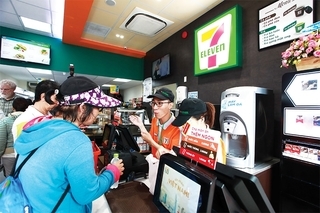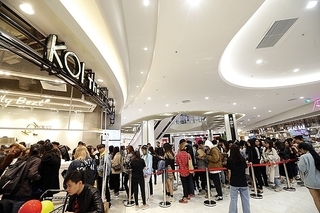 |
|
Retailers are feeling the bite of COVID-19 as business grows scarce
|
According to Nishitohge Yasuo, CEO of AEON Vietnam, business was fairly good in January thanks to buoyant transactions ahead of Vietnam’s traditional Lunar New Year holiday.
Sales, however, saw a decline this month. He attributed this to the emergence of COVID-19, which has brought a plunge of 20-30 per cent in visitor number to AEON’s shopping venues.
“Instant food, dried goods, face masks, and hand sanitisers are the best selling items at present,” Yasuo said.
Fashion items and footwear, however, see flat business at big trading centres. Fearing the epidemic, people have refrained from going to crowded places like supermarkets in the past month.
The retail outlets of big fashion brands like Zara and H&M face a similar situation. The stores of local shoe brand Bata or renowned luggage brand Samsonite at Time City shopping mall are also reporting gloomy business.
Nguyen Thu Trang, the manager of a local branded fashion shop, shared that the shop’s revenue took a nosedive, shedding 70 per cent against the same period last year.
“Throughout my many years as a shop manager, I have never seen such indifference among customers. Sales are unlikely to bounce back even at big upcoming occasions like the International Women’s Day on March 8,” Trang said.
As customers are hesitant to visit crowded places due to fear of the epidemic, their demands could be transferred to the online marketplace.
Nguyen Thanh Thuy, who has been managing a night club in Hanoi’s Old Quarter, and a chain of homestays mainly serving foreign visitors for the past 12 years, said that business was bleak these days, with the turnover from selling drinks at the club tumbling by about 60 per cent a night compared to the time before the outbreak.
Sales figures were better for shops selling appliances and electronics such as dehumidifiers and driers in the past days. According to the owner of a supermarket selling appliances and electronics on Hanoi’s Hai Ba Trung Street, dehumidifiers have been selling robustly while the purchases of common goods like TV sets, refrigerators, and washing machines were down 30-40 per cent. The situation is anticipated to drag on in the forthcoming months.
Several retailers said that they are striving to fuel sales by leveraging e-commerce.
In Ho Chi Minh City, Vietnam’s growth engine, the implications of the virus are particularly pronounced: city-based businesses revealed that the sectors posting sliding revenue include aviation, travel, banking, food and beverage, and agriculture.
As customers are hesitant to visit crowded places due to fear of the epidemic, their demands could be transferred to the online marketplace. Several cosmetics and fashion retailers have been offering discounts of up to 30 per cent for online buyers. To ensure customer safety, many services trading points have been installing air cleaners or offering free face masks at the entrance.
In the case of Sua Xanh, a startup group consisting of young graduate students based in Ho Chi Minh City which sells organic milk products, members of the group initially decided to take some time out due to the COVID-19 which led to a decline in the number of customers. They then decided to change their brand identity, selling nut-based milk to strengthen the immune system.
Not only that, the members have searched for useful information to consult customers and advise them on ways to detoxify and improve resistance. They also deliver products to customers' homes. This way, not only did they manage to improve revenue, the group have expanded sales points from four to 15, based in Ho Chi Minh City’s districts 1 and 3.
Similarly, Ly Ngu restaurant selling fried fish in District 1, has switched to online sales with free shipping and even sends a chef to customer’s house upon request.
As watermelons are sold at a heavy discount price at VND8,000 (3.5 US cents) per kg, to help farmers, the shop started offering customers free melon juice. This helps attract customers, many of whom return.
Figures from the Ministry of Industry and Trade show that Vietnam posted VND346.2 trillion ($15 billion) in retail revenue in January, a 6.3 per cent jump compared to the previous month and up 10.7 per cent on-year. The figures for February, however, would be less rosy due to the COVID-19. VIR
Yen Thuy

Innovation the name of the game for retailers
Applying technology in the retail industry is the next step in its evolution and will enable the offering of new experiences for customers while, conversely, retailers that are sluggish to update and innovate face being left behind.

Japan’s retailers reaching out to Vietnam’s market
Japanese retailers are increasingly amplifying business activities in Vietnam as the country’s middle class expands amid market conditions in their home country slowing down.
 Feeling the bite of the ongoing coronavirus (COVID-19) outbreak, many businesses in retail and services are coming up with measures to soften the blow.
Feeling the bite of the ongoing coronavirus (COVID-19) outbreak, many businesses in retail and services are coming up with measures to soften the blow.